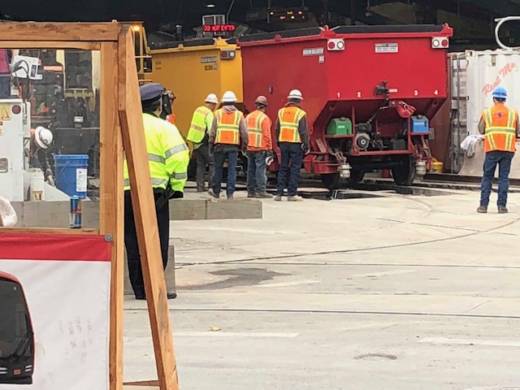After Ricketts was killed, news reports disclosed workplace regulators had issued dozens of safety violations in the last decade against one of the companies involved in the tunnel project, Oakland-based Shimmick Construction. That included a $50,000 fine in 2016 in connection with the death of a worker operating a forklift.
Despite that penalty, Shimmick had told city officials when it bid for the tunnel project that it had not been cited for any serious or willful safety violations by California's Division of Occupational Safety and Health, Cal/OSHA.
After the accident, Cal/OSHA and San Francisco police launched investigations into the Aug. 10 incident that killed Ricketts.
Since then police have closed their case, according to SFPD spokesman Sgt. Michael Andraychak.
"There does not appear to be any criminal element to the case," Andraychak said in an email.
But until now few details have emerged about the incident.
Autopsy Findings
The San Francisco medical examiner's report says the episode began with one of Ricketts' fellow workers driving a rail crane -- a piece of construction equipment used to transport and lift heavy gear or construction materials -- into the West Portal tunnel
As the crane inched along, pushing two flatbed rail cars in front of it, its elevated arm struck and dislodged a steel beam that had been placed as temporary support inside the tunnel.
The falling beam struck Ricketts, a signal technician from the Colusa County town of Williams. The report says he suffered a wide range of traumatic injuries, including shattered ribs, a collapsed lung and a severed spinal cord. Ricketts also sustained injuries to his back, head and neck. The medical examiner's office classified the cause of death as blunt force injuries of the chest.
Craig Peters, a partner at Altair Law who specializes in heavy equipment accidents, reviewed the autopsy findings for KQED.
"You have a lot of people in a very small space, which means you got to have a super-strong protocol for safety and clearly they didn't," Peters said.
"If you are knocking over a massive beam, you have clearly failed to implement basic safety precautions," Peters said.
The medical examiner's report says that paramedics found Ricketts lying down and unconscious on the gravel — but breathing and with a pulse — on the West Portal side of the tunnel. While they were tending to him, he went into traumatic cardiac arrest.
Emergency room staff were able to re-establish a pulse, the report says. But while doctors were performing a CT scan on Ricketts, "the subject arrested again and could not be revived."
The report also notes that Ricketts' hardhat was not found at the scene of the accident and one was not located at the hospital.
Peters says while hardhats are important for construction protections, wearing one in this incident would not have saved Ricketts life. But he notes the absence of one might shed light on the company's safety culture.
"They might be indications of the laxity in safety precautions that were being taken generally in this project," Peters said.
A spokesman for Shimmick declined to comment.
New Construction Bid Rules
The SFMTA began implementing its new contractor requirements on Jan. 10, when bids for the first phase of a $90 million project to improve its L-Taraval line began, according to Rose, the agency spokesman. The agency plans to replace worn rails, overhead wires, water and sewer lines along Taraval Street in a job expected to last two years.
Before those new rules were put in place, companies on all Muni infrastructure projects were required to have safety representatives on hand. Those workers can be members of the construction team who also have safety responsibilities.
Now, more of the agency's contractors will need to have dedicated supervisors or managers who are certified safety professionals on hand. Their sole responsibility is safety, and they're required to be on job sites full time and available 24 hours a day, seven days a week.
The agency's contractors must also now provide more documents about their safety history and Cal/OSHA citations, and they need to submit more detailed safety and work plans, Rose said.
Peters described the SFMTA's contractor changes as good — but not strong enough. He emphasized that the agency should essentially make the firms pay to keep their workers safe.
"Require the employer to provide minimum short-term and long-term disability policies for all workers, along with life insurance policies for workers," Peters said. "That's an added cost to the contractor, but they are now motivated by their bottom line to improve their safety."
SFMTA does not currently mandate those benefits, according to Rose. But agency contractors have to provide workers' compensation benefits, which include short-term and permanent disability benefits as well as death benefits for their employees, he said.

